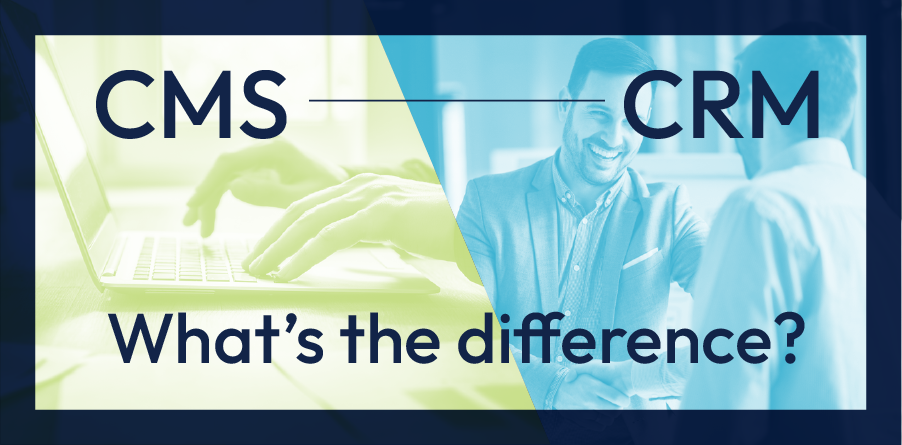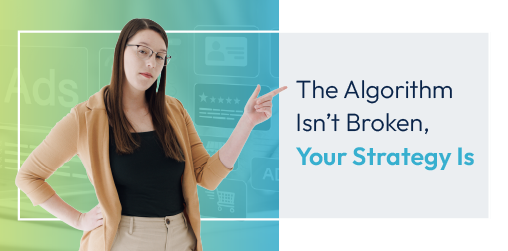CMS vs CRM: What's the Difference?

In the realm of business technology, two fundamental systems play pivotal roles in managing different aspects of operations: Content Management Systems (CMS) and Customer Relationship Management (CRM) systems. While they both contribute significantly to organizational efficiency, they serve distinct purposes and cater to different needs. Let's talk about the differences between CMS and CRM systems to understand their unique functionalities and benefits.
CMS vs CRM: A Basic Answer
At their most basic level, a CRM is used to manage customer relationships, while a CMS is used to manage a website.
What is a CMS?
A Content Management System (CMS) is a software application that facilitates the creation, modification, and organization of digital content. It empowers businesses to manage their website content efficiently, including text, images, videos, and other multimedia elements. The backend of your website is managed by the CDA: content delivery application. This part of the software facilitates creating, editing, and publishing content. The CMA, content management application, manages the frontend of your website, including how images and text are viewed.
What’s the alternative of a CMS? Without a CMS, website managers have to interact directly with their web server, such as uploading new HTML files to the server whenever a change is needed. In other words, a CMS is extremely important for online businesses consistently posting content and making regular website changes/updates.

Duda, WordPress, Squarespace, and Shopify (specifically designed for ecommerce) are a few major CMS vendors, but the options are many. Because of this, choosing the best CMS for your organization can be difficult.
I recommend these resources as you decide on a CMS:
- For ecommerce businesses, should you sell on Amazon or Shopify?
- Is WordPress a good option for ecommerce businesses?
- How can you choose the best CMS for SEO efforts?
- An overview of Duda, one of the best streamlined, lightweight content management systems available.
Of course, you can also reach out to our team of web development experts for advice – we love helping businesses thrive online on the RIGHT platform for them. Too often, businesses build websites on content management systems that are not aligned with their goals and needs. Avoid this by chatting with experts right away.
What is a CRM?
On the other hand, a Customer Relationship Management (CRM) system is designed to centralize customer data, streamline interactions, and improve relationships with clients. Here's a closer look at CRM systems:
- Customer Data Management: CRMs consolidate customer information, such as contact details, purchase history, communication logs, and preferences, into a unified database accessible to authorized users.
- Sales and Lead Management: They facilitate lead tracking, sales pipeline management, and automated workflows for sales teams, enhancing efficiency and productivity in the sales process.
- Marketing Automation: Many CRMs offer marketing automation features, including email campaigns, lead scoring, and customer segmentation, to target and engage prospects effectively.
- Customer Service Support: CRMs often include tools for managing customer support tickets, tracking interactions, and delivering personalized assistance, fostering positive customer experiences.
Popular CRM systems include Salesforce, HubSpot, Zoho CRM, and Microsoft Dynamics 365. They are invaluable assets for businesses aiming to cultivate lasting relationships with customers, drive sales growth, and improve overall customer satisfaction.
Websites with style, purpose, and strategy.
You only have seconds... Does a glance at your current website effectively communicate who you are, what you do, and why it matters to your visitor? Our web design blends beautiful on-brand design with intentional marketing strategy to ensure your website both captivates and converts. We believe your website should actively draw an audience, connect with them, and most importantly, motivate them to take action.
CMS/CRM Key Differences and Complementary Roles
The primary difference between CMS and CRM systems lies in their focus and functionality:
- CMS: Focuses on content creation, website management, and digital marketing. It's ideal for businesses aiming to create and deliver engaging content to their audience, enhance brand visibility, and drive online engagement.
- CRM: Focuses on customer data management, sales automation, and customer relationship nurturing. It's crucial for businesses looking to streamline sales processes, improve customer interactions, and maximize revenue opportunities.
While CMS and CRM systems serve distinct purposes, they often complement each other in business operations. Integrating a CRM with a CMS can create a seamless workflow, where customer data from the CRM informs personalized content creation and marketing strategies implemented through the CMS. This integration fosters a cohesive approach to customer engagement and business growth.
Understanding the roles of CMS and CRM systems is essential for leveraging their respective benefits in modern business environments. Whether you're focused on creating captivating content or nurturing valuable customer relationships, implementing the right technology solutions can significantly enhance your organization's efficiency, productivity, and success.
RivalMind: Committed to Business Growth
At RivalMind, we exist to help companies thrive. When businesses are successful, the people who make up the organization are successful – and people are our passion.
If you have questions about the right management tools for your organization, let us know! We would love to help you identify the best CMS or CRM for your goals. View some of our favorite web development projects
in our portfolio.

Meet the Author
Jessica Goodrum
Director of Creative Services
Jessica Goodrum is a digital marketer with over a decade of experience in digital project management. As Director of Creative Services at RivalMind, she is responsible for the success of website design and development projects, as well as social media client growth. Her approach to management – both projects and staff – is “transparency.” She consistently outlines project objectives and the steps to get there, assessing how RivalMind can improve upon every client’s experience.
Specialties: Duda Web Development, Keeping It All On Task
Looking for more organic website traffic?
Welcome to RivalMind. Our purpose is to help your business thrive. We are a digital marketing agency that offers SEO, PPC, Web Design, Social Media and Video Solutions as tools to our clients for online business development and growth.
Contact us today to get started!
Blog Contact Form
Connect with Us:




